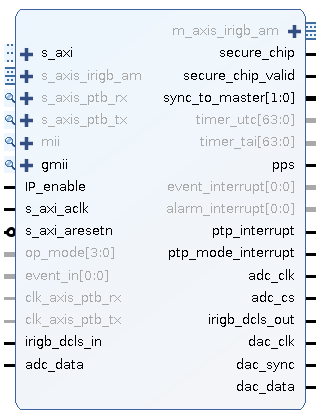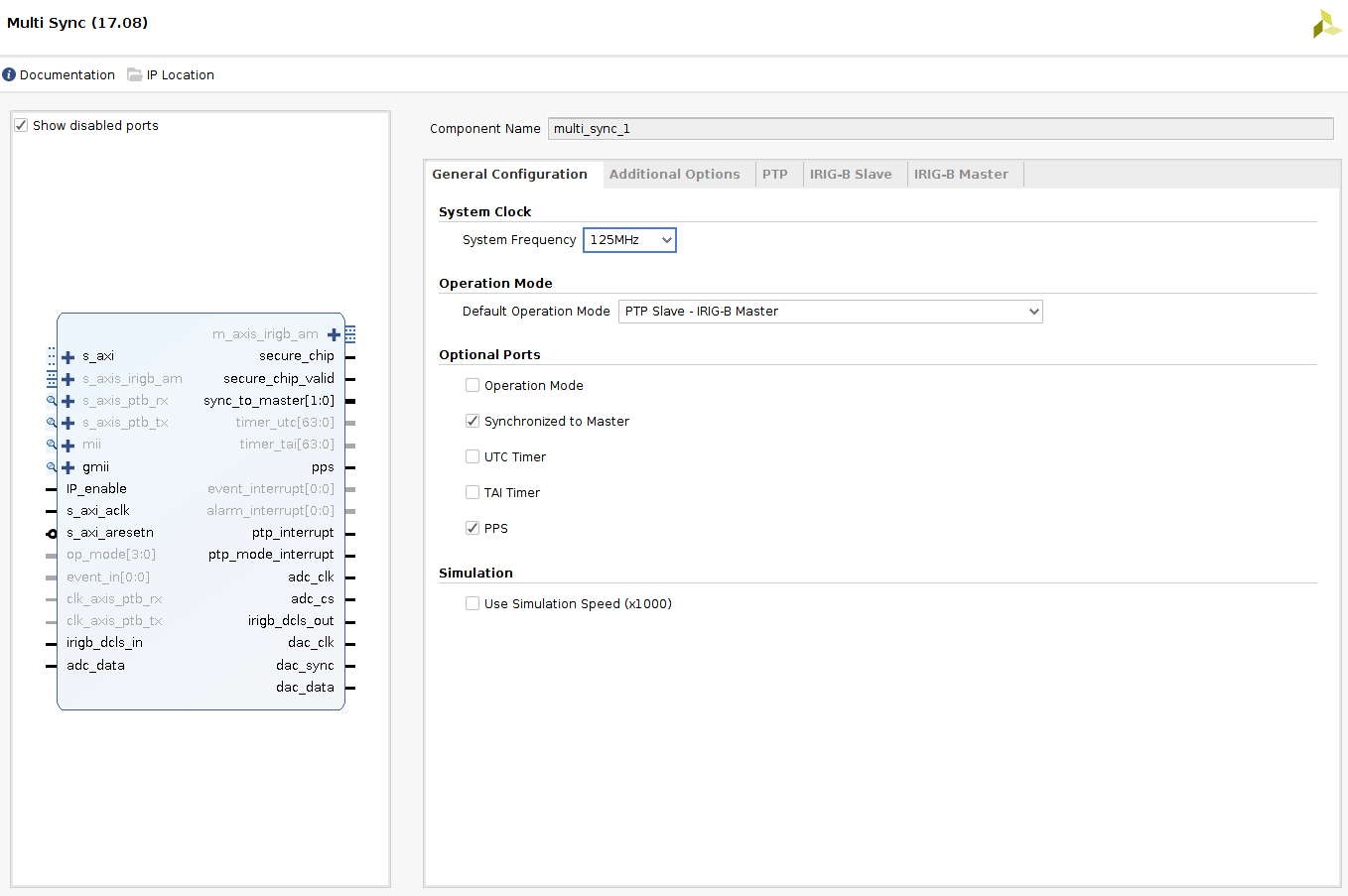
MULTIsync IP Core is a multi-protocol redundant time synchronization core that provides sub-microsecond time synchronization, providing maximum flexibility for every scenario. It is able to provide time synchronization using IEEE 1588-2008 (PTPv2) and IRIG-B time synchronization protocols.
MULTIsync IP Core supports the following synchronization input sources:
- PTP: Ethernet. PTP Slave at the input
- IRIG-B: IRIG-B compliant signal. IRIG-B Slave at the input
- Free Running Timer: Digital input
MULTIsync IP Core supports the following synchronization output options:
- PTP: Ethernet. PTP master at the output
- IRIG-B: IRIG-B compliant signal. IRIG-B Slave at the output
- Free Running Timer: Digital Output
This versatility enables different cases-of-use for MULTIsync that are complementary:
- It can provide time synchronization redundancy, making possible to connect the IP to a PTP network and to an IRIG-B master at the same time. The user is able to select which is the time source used between the three available ones (PTP, IRIG-B, free running timer)
- It can act as a PTP to IRIG-B or IRIG-B to PTP bridge while the IP is synchronized with the selected master
- It can act a PTP or IRIG-B grandmaster
MULTIsync can be used in combination with SoC-e HSR-PRPSwitch, TSNSwitch, UnmanagedEthernetSwitch or ManagedEthernetSwitch IP cores to introduce Ethernet traffic switching capabilities or HSR and PRP redundancy.
MULTIsync is supported on the following Xilinx FPGA Families:
- 7-Series (Zynq, Spartan, Artix, Kintex, Virtex)
- Ultrascale (Kintex, Virtex)
- Ultrascale+ (Zynq MPSoC, Kintex, Virtex)
- Versal ACAP

MULTIsync is designed to be easily integrated in your FPGA designs by taking advantage of the new Xilinx Vivado Tool, that allows to use the IP Cores in a graphical user interface and configure IP parameters in an easy way.
MULTIsync IP Core main features:
- Multi-protocol redundant time synchronization.
- IEEE 1588-2008 (PTPv2) and IRIG-B time synchronization protocols supported simultaneously.
- 12 different operation modes.
- 3 independent 64-bit adjustable timers associated to each slave. (32 bit sub-nanosecond frequency adjust.
- One Pulse Per Second Output available.
- Event timestamping supported (up to 4 different events simultaneously).
- Alarm detection supported (up to 4 different alarms simultaneously).
PTP Features
- 10/100/1000 Mbps Ethernet operation supported.
- AXI-S interface supported:
- 1 Gigabit Ethernet: 8-bit data width.
- 10 Gigabit Ethernet: 64-bit data width.
- Selection if the Ethernet frame includes the preamble or not.
- 16 position FIFO depth. Old timestamp values are stored for avoiding overrun.
- End-to-End and Peer-to-Peer delay mechanisms support.
- Support for PTP on both, Layer 2 (Ethernet) and Layer 3 (IPv4) interfaces.
- Support VLAN tagged PTP messages.
- IEEE1588 Profiles: Default, Power, Power-Utility (IEC61850-9-3), AS.
IRIG-B Slave Features
- Support for DCLS and AM modulations.
- Internal filtering of the AM signal.
- Support for all IRIG-B coded expressions, including year information, control functions and straight binary seconds.
- IEEE-1344 extension support.
- Input type (IRIG-B time code) confi gurable both before implementation and on the fly.
- Implements a generic ADC controller compatible with SPI, QSPI and MICROWIRE protocols.
IRIG-B Master Features
- Support for DCLS and AM modulations.
- Support for all IRIG-B coded expressions, including year information, control functions and straight binary seconds.
- IEEE1344 extension support.
- Output type (IRIG-B time code) confi gurable both before implementation and on the fly.
- Implements a generic DAC controller compatible with SPI, QSPI and MICROWIRE protocols.
Free Running Timer Features
- Fully managed by the user (time and frequency adjustment).
Supported boards for the Reference Designs:
- SoC-e SMARTzynq brick (Recommended)
- For other Xilinx/Avnet/SoC-e boards, we can provide a time-limited IP Core for evaluation.
